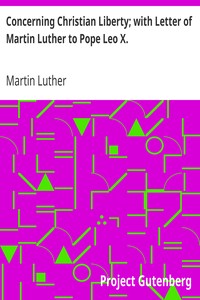Concerning Christian Liberty; with Letter of Martin Luther to Pope Leo X. by Luther
"Concerning Christian Liberty; with Letter of Martin Luther to Pope Leo X." by Martin Luther is a treatise written in 1520. As the third of Luther's major reforming works that year, it explores a revolutionary concept: Christians, as forgiven children of God, are no longer compelled to keep God's law for salvation, yet freely choose to serve God and their neighbors. Luther develops his doctrine of justification by faith, declaring that a
Christian is simultaneously the "most free lord of all" and the "most dutiful servant of all." (This is an automatically generated summary.)
Read or download for free
| Reading Options | Url | Size | |||
|---|---|---|---|---|---|
| Read now! | https://www.gutenberg.org/ebooks/1911.html.images | 135 kB | |||
| EPUB3 (E-readers incl. Send-to-Kindle) | https://www.gutenberg.org/ebooks/1911.epub3.images | 135 kB | |||
| EPUB (older E-readers) | https://www.gutenberg.org/ebooks/1911.epub.images | 135 kB | |||
| EPUB (no images, older E-readers) | https://www.gutenberg.org/ebooks/1911.epub.noimages | 111 kB | |||
| Kindle | https://www.gutenberg.org/ebooks/1911.kf8.images | 345 kB | |||
| older Kindles | https://www.gutenberg.org/ebooks/1911.kindle.images | 335 kB | |||
| Plain Text UTF-8 | https://www.gutenberg.org/ebooks/1911.txt.utf-8 | 119 kB | |||
| Download HTML (zip) | https://www.gutenberg.org/cache/epub/1911/pg1911-h.zip | 135 kB | |||
| There may be more files related to this item. | |||||
Similar Books
About this eBook
| Author | Luther, Martin, 1483-1546 |
|---|---|
| Title | Concerning Christian Liberty; with Letter of Martin Luther to Pope Leo X. |
| Note | Wikipedia page about this book: en.wikipedia.org/wiki/On_the_Freedom_of_a_Christian |
| Credits | Produced by Elizabeth T. Knuth and David Widger |
| Reading Level | Reading ease score: 62.5 (8th & 9th grade). Neither easy nor difficult to read. |
| Language | English |
| LoC Class | BR: Philosophy, Psychology, Religion: Christianity |
| Subject | Reformation -- Germany |
| Category | Text |
| EBook-No. | 1911 |
| Release Date | Feb 26, 2006 |
| Most Recently Updated | Feb 6, 2013 |
| Copyright Status | Public domain in the USA. |
| Downloads | 1289 downloads in the last 30 days. |
| Project Gutenberg eBooks are always free! | |

